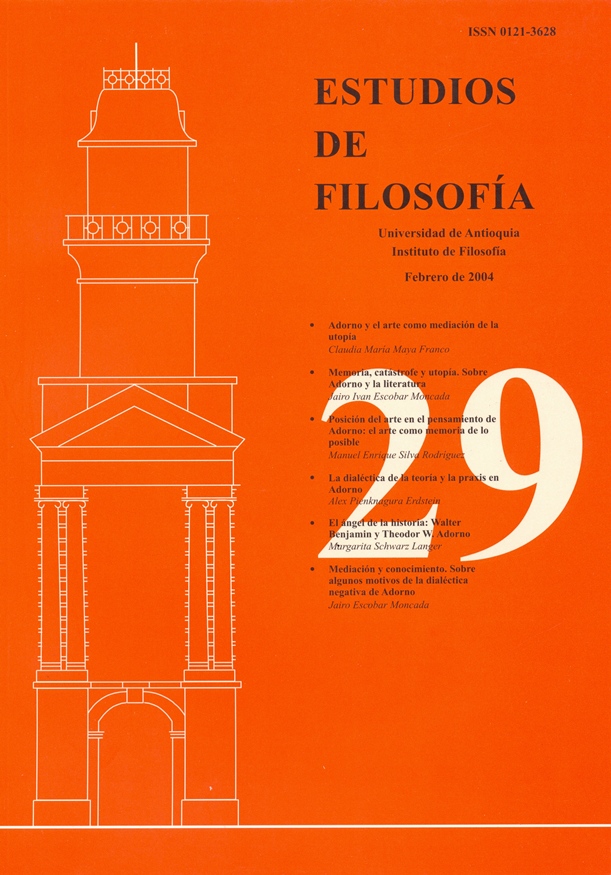The Angel of History: Walter Benjamin and Theodor W. Adorno
DOI:
https://doi.org/10.17533/udea.ef.12944Keywords:
History, angel allegory, progress, name, tank, idea, conceptAbstract
This paper intends to establish a small correlation, by way of hemage, between Theodor W. Adorno's though; and that of his beloved teacher, Walter Benjamin. He tries that bind both thinkers can be found in the weight of the words that they share, in the context of German critical philosophy and the Jewish roots that links them. Under the allegoric figure of the angel of history, bonds are woven among a selection of quotations taken from Adorno's Negative Díalectics and front some concepts expounded in Benjamin's The Original of Baroque Drama.
Downloads
References
Literatura primaria
ADORNO, Theodor W. Dialéctica Negativa. Madrid: Editorial Taurus, 1975.
BENJAMIN, Walter. Ursprung des Deutschen Trauerspiels, Band 1 1, Frankfurt: Suhrkamp, 2000.
Literatura secundaría
ADORNO. Theodor W. Negative dialektik. Jargon der Eigentlichkeit. Band 6. Darmstadt: Wissenschaftliche Buchgesellschaft. 1998.
__________________. Sobre Walter Benjamin. Madrid: Cátedra Teorema. 1995.
BENJAMIN, Walter. Johann Wolfgang Von Goethe. Farbenlehre. Gesammelte Schriften. Band III, Frankfurt: Suhrkamp, 2000.
__________________. Der Begrijfder Kunstkritik in der Deutschen Romantik. Band I 1, I 2. Frankfurt: Suhrkamp, 2000.
__________________ . Ober den Begriffder Geschichte. Gesammelte Schriften. Band 1-2. Frankfurt- Suhrkamp, 2000.
__________________ . Berliner Kindheit um Nuenzehnhundert. Gesammelte Schriften. Band IV-1. Frankfurt Suhrkamp. 2000.
BUCK MORSS, Susan. Dialéctica de la mirada Madrid: Visor. 1995.
SCHOLZE, Britta. Kunst als Kritik. Adornos Weg aus der Dialektik. Würzburg: Königshausen & Neumann. 2000.
WEIGEL, Sigrid. Cuerpo, imagen v espacio en Walter Benjamin. Buenos Aires: Paidós. 1999.
Downloads
Published
How to Cite
Issue
Section
Categories
License
Copyright (c) 2004 Estudios de Filosofía

This work is licensed under a Creative Commons Attribution-NonCommercial-ShareAlike 4.0 International License.
Authors who publish with this journal agree to the following terms:
1. The Author retains copyright in the Work, where the term "Work" shall include all digital objects that may result in subsequent electronic publication or distribution.
2. Upon acceptance of the Work, the author shall grant to the Publisher the right of first publication of the Work.
3. The Author shall grant to the Publisher a nonexclusive perpetual right and license to publish, archive, and make accessible the Work in whole or in part in all forms of media now or hereafter known under a Creative Commons Attribution-NoCommercia-ShareAlike (CC BY-NC-SA 4.0), or its equivalent, which, for the avoidance of doubt, allows others to copy, distribute, and transmit the Work under the following conditions: (a) Attribution: Other users must attribute the Work in the manner specified by the author as indicated on the journal Web site;(b) Noncommercial: Other users (including Publisher) may not use this Work for commercial purposes;
4. The Author is able to enter into separate, additional contractual arrangements for the nonexclusive distribution of the journal's published version of the Work (e.g., post it to an institutional repository or publish it in a book), as long as there is provided in the document an acknowledgement of its initial publication in this journal;
5. Authors are permitted, and Estudios de Filosofía promotes, to post online the preprint manuscript of the Work in institutional repositories or on their Websites prior to and during the submission process, as it can lead to productive exchanges, as well as earlier and greater citation of published work (see The Effect of Open Access). Any such posting made before acceptance and publication of the Work is expected be updated upon publication to include a reference to the Estudios de Filosofía's assigned URL to the Article and its final published version in Estudios de Filosofía.















